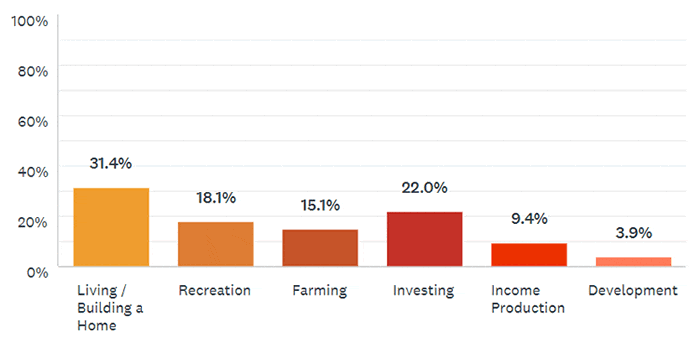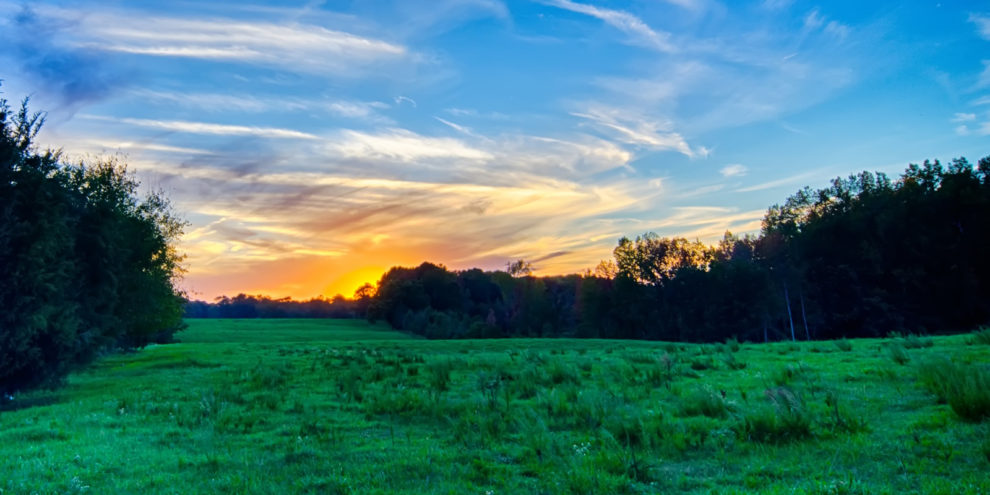Last month, the LANDTHINK Pulse posed the following question to our audience: What is (would be) your primary purpose for purchasing land?
March Pulse Sponsored by
Our informal online survey revealed that 31.4% of respondents indicated that their main goal in purchasing land was to live on the property- and if their dream home doesn’t exist yet- build it themselves. Buying land and building a home gives a buyer much more flexibility and freedom than purchasing an existing home does. Whether you dream is to live on many acres, design a homestead property or purchase a residential lot for sale, there are many options available for interested buyers.
Buying land and building your own house is uncharted territory for most people. It is a very different process- and albeit a complicated one- compared to purchasing an existing house, but is usually a gratifying experience for the buyer, both financially and emotionally. If you’re just beginning your search for a homesite on land listing sites like LANDFLIP, or if you’ve wisely secured the services of an experienced land agent, there are things to keep in mind when buying land to build a home.
The evaluation process for land you intend to build on comes with a different set of considerations than other types of land purchases. Evaluating Land You Intend to Build On in the Future, by Jennifer Beecher, with Mossy Oak Properties Coastal Land & Real Estate, offers some tips for rural land buyers and brings to light some of the not-so-obvious aspects involved in purchasing land. Buying any type of undeveloped land can hold numerous surprises and it’s the less visible details that could cost you extra money or even determine whether or not you can build on the land as planned.
Here’s a shortlist of some things to consider first:
How is the property zoned? Zoning laws control the way in which the land can be developed and what purposes the zoned land can serve. Zoning laws also regulate more specific details of construction, such as maximum building height, minimum lot size or how far a house needs to be setback from the road.
How much site preparation will the land need? Usually the land will need to be cleared to prepare for house construction and the cost will fluctuate depending on the topography and how much work will need to be done before construction can commence.
Is there access to utilities? Any piece of land you’re eyeing for a home will need access to water, natural gas, sewer, etc. If there is no sewer, you need to know if the land will accommodate a septic tank. If the property is in a remote area, check on cell and internet service. If utility connections are not in place, find out what it will cost to run them to your property.
How will the land and home be financed? Will you be purchasing the land outright, or securing a loan? There are three types of loans that buyers can seek to purchase land and build homes: a land or lot loan, a construction loan or a construction-to-permanent loan.
Coming in a close second, 22.0% of respondents indicated that their primary interest in purchasing land would be as an investment. The current COVID-19 crisis confirms the value of a diversified portfolio. The stock market is essentially unpredictable, and more investors are adding “hard” (physical) assets such as timberland to their portfolio.
The “buy and hold” strategy is usually the most profitable for investors in most types of rural land for sale, particularly low-maintenance tracts such as timberland or pastureland. According to Curtis Seltzer, land consultant and author, buying and holding rural land is a good strategy. “Absent an unprecedented deflation, an investor with a 20-year-plus horizon is likely to be both safe and profitable with rural real estate.”
Illustrated by a few examples:
- Pasture that can be adapted to rotational grazing
- Lots under 20 acres that are in small communities with diverse economies with growing population and family incomes
- Hardwood timberland tracts that have not been high-graded too badly or recently
- Planted pine that hasn’t been thinned yet on a 20-to-30 year rotation
- Property whose assets are divisible, with a core that’s a keeper
Recreational land came in third, with 18.1% of respondents saying enjoyment would be their primary reason for buying land. There are also some solid economic and emotional reasons why buying a recreational property can pay off now and down the road.
Recreational land can provide several uses:
- Spending more time outdoors, in a place you love, with family and friends
- Specific types of recreational land can provide an ideal investment vehicle capable of producing income now and after retirement, while appreciating in value
- Gives you a place to eventually build on and move to when you retire
Before you decide to purchase recreational land there are a number of issues to consider. It’s important to uncover your motives and end goals for buying land. Ask yourself the hard questions, like, “Why do I really want to own property here?” and “What would I do with it if I were to make it mine?

The LANDTHINK audience indicated a variety of reasons for buying land. We were pleased with the large number of Pulse responses, and we thank everyone who answered the Pulse and shared it on social media with friends and connections in the land industry. LANDTHINK would like to extend a big thank thank you to Farm Credit Associations of Georgia for sponsoring the March Pulse and for coming up with a very interesting question to pose to our audience. When it comes to financing land, farms or homes, buyers have several options. Farm Credit Associations of Georgia offer advantages that aren’t available to buyers with other lenders. Their commitment and experience lending to agriculture and rural Georgia make the difference.
Become a Pulse sponsor! It’s a great way to ensure your brokerage is the first one buyers and sellers call when they have a need to buy or sell property. You’ll get insane exposure on Social + Email + Web. That’s 500,000+ monthly eyes on you! Once you have it, you won’t want to give it up! Pulse sponsorships are offered on a first come first served basis and are subject to certain limitations. If your business would be interested in sponsoring a Pulse question, please contact us soon.
Do you have a suggestion for next month’s Pulse question? Submit your question and we might choose yours!
We want to know what you think about our April Pulse question, chosen and sponsored by The Land Show with Dave and Johnny: What effect do you think COVID-19 will have on the demand for land for the remainder of 2020? Answer now.
This content may not be used or reproduced in any manner whatsoever, in part or in whole, without written permission of LANDTHINK. Use of this content without permission is a violation of federal copyright law. The articles, posts, comments, opinions and information provided by LANDTHINK are for informational and research purposes only and DOES NOT substitute or coincide with the advice of an attorney, accountant, real estate broker or any other licensed real estate professional. LANDTHINK strongly advises visitors and readers to seek their own professional guidance and advice related to buying, investing in or selling real estate.











As a realtor with Preferred Properties of Texas in Stephenville, TX, where we help alot of clients with land and ranch properties, I find this to be great article, once again, thanks for all the insightful information on what people are thinking on when buying rural real estate.